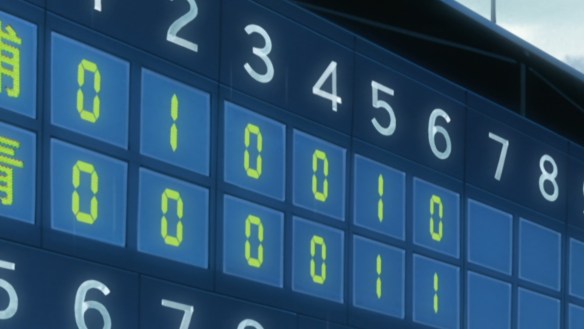Hello folks, and welcome back to Wrong Every Time. Today rain beats down on the first match of the summer tournament, as our boys from Nishiura strive to overcome the first-seated Tosei team. After managing to eke out a two-run lead across the first few innings, they were put on the backfoot by their technically superior opponents, who tightened their strategy to secure two runs of their own. With the score now tied as the innings dwindle, it’s looking like the surprise factor that carried Nishiura to early success has thoroughly run out.
Well, that’s at least one version of the story. Another concerns the growing confidence of Nishiura pitcher Mihashi, a certainty of his value that is proving infectious enough to raise the spirits and mutual trust of his entire team. Another version might prioritize the game’s information war; not only do Nishiura have far superior batting data, they also have an ace batter who’s figured out the opposing pitcher’s tells. And another might prioritize the shifting physical conditions of the battlefield; both the rain itself and its effect on the field’s texture, which has so far both inhibited Tosei’s pitcher and given Nishiura’s catcher more tools to manipulate. Asa Higuchi has constructed a marvelous multiplanar diorama of tactically grounded conflict, demonstrating the many hidden layers of this ostensibly straightforward sport, and through doing so offered us a competition that thrills and satisfies anew with each subsequent at-bat. Let’s get back to the battle!
Episode 20
The scoreboard once again offers our immediate, essential accounting of fortunes. After that first early run, the momentum clearly looks to be on Tosei’s side, who have secured runs two innings in a row. Of course, with only three innings left, practically anything could happen – with that short of a time left to adjust, any major gameplan initiated now might carry its team through the conclusion
In professional baseball, the idea that one pitcher would handle an entire game is absurd. A professional level pitch is a feat beyond the capacity of the human body; it wears you out permanently, all the more so if you push yourself to exhaustion. To say nothing of how utilizing multiple pitchers can provide key strategic advantages, forcing the opposing batters to learn a new pitcher’s style multiple times per game
We also recap the last key emotional beat of the previous episode, as Mihashi surprises his teammates with his newfound confidence
With two outs, the next batter up is Motoyama, the last in Tosei’s batting order
“Aiming for the corner, again.” Mihashi’s reflections on Abe’s signals are also starting to sound more comfortable, like he’s in active conversation with Abe rather than just following his superior’s orders. A thawing of relations that will presumably lead to Abe being challenged regarding his own defensive philosophy, and perhaps learning to see the battery as an equal partnership. Of course, there’s only so much communication that can take place between the catcher’s signals and the pitcher’s nod or head shake
The at-bat goes perfectly for our boys, with Mihashi’s perfect accuracy and Abe’s shifting strategy seeing them through to the seventh
Mihashi’s cousin Ruri made some truly adorable mini-flags to wave for Mihashi’s strikeouts
An amusing contrast of storyboarding and dialogue here, as Mihashi’s preparations for his at-bat are accompanied by a running commentary of Ruri and the moms discussing who’s going to what school with which other kids. A sequence that both emphasizes the potential future challenge of Ruri’s brother Ryu and also cuts the tension of our own drama, allowing things to settle back to a baseline for this seventh inning
“Ren’s struck out while we were chattering.” I imagine most of this dialogue comes from the original manga, but Tsutomu Mizushima is nonetheless particularly gifted at fitting abundant incidental dialogue into a well-paced shell, as demonstrated through the running patter of shows like Girls und Panzer, Shirobako, and The Magnificent Kotobuki. Even his adaptations have a similar snappiness of dialogue pacing, as demonstrated in Witch Craft Works and Prison School
Some excellent, well-choreographed cuts of pitching and field work carry us through the top of the seventh, with the very fluidity of these movements emphasizing Tosei’s well-oiled machine
“He’s getting more and more exhausted trying to meet my requirements.” Abe’s thoughts are shifting as well, as he embraces more responsibility for Mihashi’s condition. A key transition from “I wish I could do everything myself” to “I wish I could do more to elevate my teammates”
“A catcher can do very little for his pitcher.” Certainly not the thoughts of first episode Abe!
“I want to win. I want him to feel good, too.” “I want to win!” Once again, it’s ultimately Mihashi reassuring Abe, taking some of the psychological weight off his shoulders
First up is pitcher Takase, who’s still holding to the “wait for a curveball” general strategy. No surprise that the pitcher would just follow the coach’s orders on offense
“Once we’re done with the seventh inning, the game is almost over!” Abe notes this is the worst point for pitchers, where their stamina is flagging but the ending still seems distant
From the opposing side, Takase can’t figure out Mihashi’s pitches at all. He keeps assuming they’ll be standard fastballs, not appreciating Mihashi’s pinpoint control
“It’s possible that only the clean-up’s given the option to pick what pitch he’ll go for.” A tactic that offers the secondary benefit of confusing Abe’s attempts to draw clear patterns from the opposing batters
Abe thus intentionally calls for bad curveballs to bait swings, but the batter unfortunately connects and takes first
“He’s started panting so hard his whole body shudders. He hasn’t even thrown sixty pitches today!” Basically impossible to recreate the pressure and subsequent strain of an actual event through practice, whether it’s sports or performance or whatever. The crowd drains you, and you drain yourself by burning through the adrenaline that crowd provokes
“Let’s use curveballs to tricky spots!” Abe now intentionally baiting swings with the knowledge they only swing at curveballs, presumably hoping to even further limit Mihashi’s required pitches with an easily caught foul or pop fly. Anything they can do to lower that final pitch count
“Even though we haven’t made any mistakes, they keep getting lucky hits that have the same results as errors on our part.” Heartbreaking that the game can hang on whether one half-tagged ball goes foul or stays within the line
With Mihashi’s fastball now entering the pool, the opposing batters are doing their best to learn its eccentricities. The catcher describes it as “floating,” presumably his analysis of how Mihashi’s combined slowness and precision means his fastballs don’t necessarily sink at the same rate as a full-power pitch would
That bad luck continues as Mihashi slips in the mud, releasing a loose ball that results in a third run. A brutal test of how much he’s grown this season, and if he can brush off the guilt of so directly hurting their chances
Yep, Mihashi’s back to stressing out and avoiding eye contact with his teammates
“There’s no place to hide on the mound.” The fundamental contradiction of Mihashi’s personality
“We don’t have anybody else but you. So hang in there!” Even Abe is backsliding, relying on threats to keep Mihashi pointed in the right direction
Fortunately Mihashi pulls himself together, and an intentional walk gives him the time to settle physically as well
A high-angle shot presents the world as Mihashi sees it, the small battleground of his pitcher’s mound. He can’t really pitch effectively if he expects the ground itself to betray him
As Tosei’s batters become more comfortable swinging at Mihashi’s pitches, Abe punishes their confidence by directing Mihashi to pitch further and further outside the strike zone
And they finish the inning without further incident, in spite of Mihashi having to use more pitches than desired to get their final batter out. His increasing exhaustion is raising another complication: how often can they attempt to dance around a batter with more pitches, versus prioritizing getting him off the plate no matter what?
At this point, it seems like it might not matter – the umpires are already conferring about calling the game due to rain, and Mihashi is a mess, dousing himself in cold water and possessing no grip strength at all
A consistent motif here – the clasping of hands as a gesture of unity, from Abe’s concord with Mihashi to their morning meditation rituals to the simple high-fives that affirm their mutual support on the field
Ruri storms in to announce that Kanou has won, which seems to bolster Mihashi’s determination. With that jolt from his old rivals and the lighthearted support of his new teammates, his grip returns. Two innings to go!
And Done
Man, our boys are really fighting for their lives out there! Tosei’s players are honing in on Mihashi’s pitching style, Mihashi himself is totally exhausted, and the rain continues to wreak random havoc on the field. And yet, in spite of Tosei gaining the lead for the first time yet, this actually felt like a much more optimistic episode than the last, owing largely to how well our boys recovered from the worst case scenario. Mihashi’s loose ball was the ultimate test of his development since the first episode, and though there were some moments where it seemed both he and Abe would backslide on their personal development, all of that ultimately just affirmed that in spite of their natural tendencies, they have come to trust each other more than they trust their own doubts. With the boys in confident battle array, they’ve got two innings left to take the fight to Tosei!
This article was made possible by reader support. Thank you all for all that you do.




